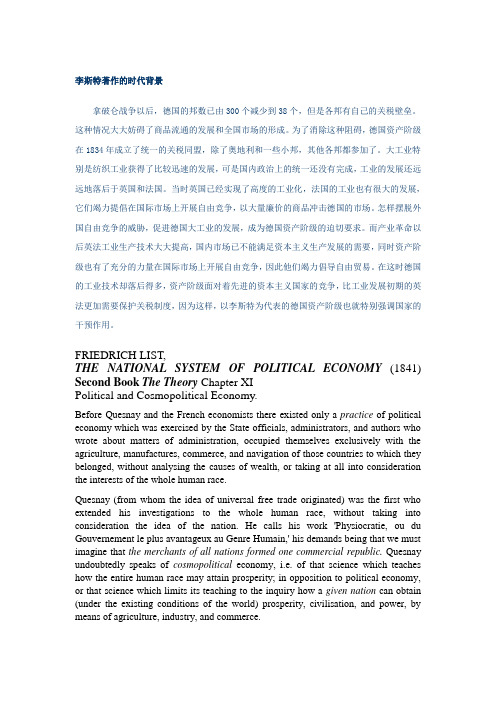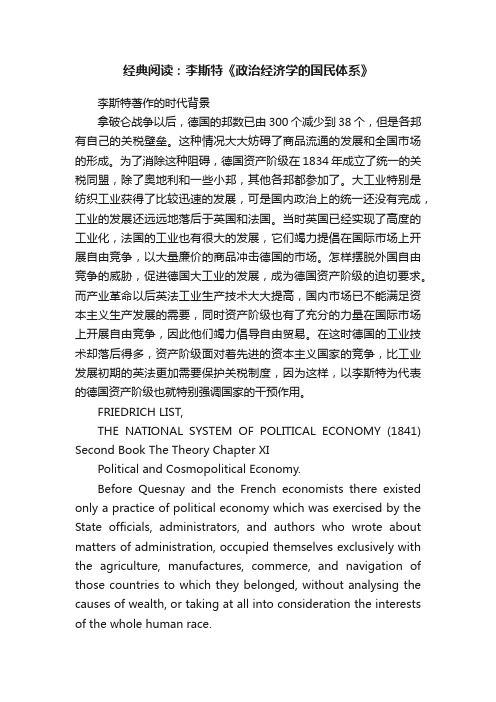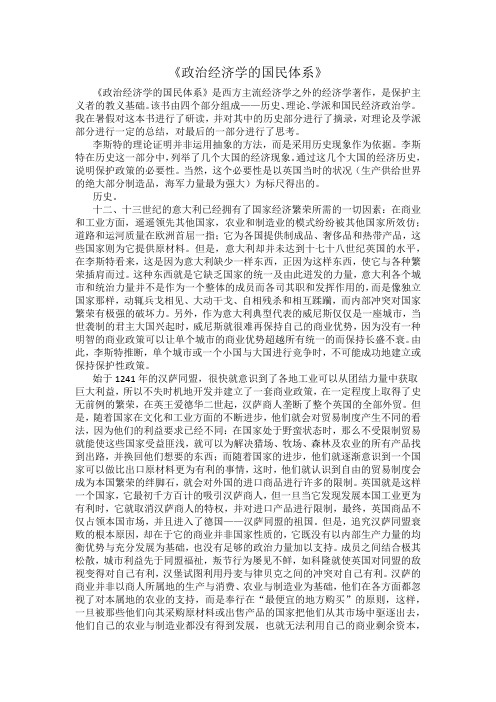政治经济学的国民体系》-PPT精品文档
读《政治经济学的国民体系》

读《政治经济学的国民体系》一、全书思路对欧洲各主要政治势力的兴衰成败进叙述、分析、归纳,指出了提高一国竞争力所必备的两点:1,统一、稳定、团结、自由的主权国家。
2,先进的工业生产力。
随即从理论层面对这两点加以论述,提出国家经济学概念和生产力理论,并驳斥了斯密的自由贸易主张和世界经济学的论点,同时指出了实施关税保护政策以全力发展本国工业的必要性。
最后对历史上相关学派和各主要国家曾经实施的经济政策予以评述,以巩固自己的观点。
二、主要论点国家经济学:指出国家经济与世界经济的差别,各国均有各自无从抹煞的经济发展水平、历史特点和不同利益,并在此基础上提出了各国经济发展必经的五个阶段,,各国只有共同达到他们可能达到的阶段,并在一个持久和平的世界联盟范围内,国际间的自由贸易菜对所有国家有利。
生产力理论:生产力包括物质资本和精神资本,财富的生产力比之财富更加重要,生产力的发展主要来自本国工业的强大,所以要已采取关税政策保护和发展本国生产为优先。
三、全书脉络第一编历史(1-10)第一章意大利人:以威尼斯盛衰之例指出:1,国别竞争要国家的统一。
2自由贸易政策需随时局转换而变更。
第二章汉撒商人:以汉撒商人重商轻本的云最方式最终衰落违例,指出发展生产力的重要性。
第三章荷兰人:指出一国强大民族性的重要性,单靠工商业是无法是国家摆脱逆境的。
第四章英国人:分析英国人称霸原因:1,适时的政治政策。
2,工业化的传承。
第五章西班牙人与葡萄牙人:以两国的衰败违例,反证宗教、政治自由是工商业深根发芽的土壤。
第六章法国人:工业的发展对一国农业的促进。
第七章德国人:指出德国工业的发展呼唤国家的统一、国内市场的自由顺畅和统一的对外关税。
第八章俄国人:指出了国民的团结和稳定的政治环境的积极作用。
第九章美国人:指出工业立国是更本,农业国是无法于工业国竞争的。
第十章历史教训:对上文史实的再归纳总结。
第二编理论(11-27)第一部分(11-16)论述国家经济学的有关理论。
第七章 国民收入的分配与社会保障制度 《政治经济学》PPT课件

▫ 1.物质产品平衡体系 ▫ 2.国民经济核算体系
• 二、社会总产值和国民收入
▫ 1.社会总产值 ▫ 2.社会最终产值 ▫ 3.社会净产值或国民收入
第一节 国民收入的决定
• 三、国民生产总值与国民收入
▫ 1.国民生产总值 ▫ 2.国民生产净值 ▫ 3.国民收入和个人收入
第三,要正确处理积累基金内部和消费基金内部的比例关系。 第四,确定合理的积累率。
第二节 国民收入的分配
• 三、我国国民收入分配格局的调整方向
▫ 国民收入分配格局主要是指国民收入在居民、企业和 政府三者之间分配的比例及相互关系。
第三节 社会保障制度
• 一、社会保障制度的内容
▫ 1.社会保险
社会保险具有以下基本特征: 第一,强制性。 第二,保障性。 第三,互济性。 第四,福利性。
(1)国家预算。 (2)银行信贷。 (3)劳务费用。 (4)价格体系。
第二节 国民收入的分配
• 二、积累基金和消费基金
▫ 正确处理这种关系需要遵循以下基本原则:
第一,在国民收入增长的基础上,要使积累基金和消费基金都 有所增长。
第二,积累基金和消费基金的比例,必须同国民收入中的生产 资料和消费资料的比例相适应。
1. 1978—1991年的恢复性改革阶段 2. 1991—2000年的探索性改革阶段 3. 2000—2006年的半积累模式试点阶段 4. 2006年至今的推广覆盖阶段
▫ (二)我国社会保障体系未来发展的方向
第二节 国民收入的分配
• 一、国民收入的初次分配和再分配
▫ (一)国民收入的初次分配 ▫ (二)国民收入的再分配
国民收入之所以必须在全社会范围内进行再分配,有下列主要原因: 第一,满足非物质生产部门发展的需要。 第二,加强重点建设和保证国民经济按比例协调发展的需要。 第三,建立社会保证基金的需要。 第四,建立社会后备基金的需要。
经典阅读:李斯特《政治经济学的国民体系》

李斯特著作的时代背景拿破仑战争以后,德国的邦数已由300个减少到38个,但是各邦有自己的关税壁垒。
这种情况大大妨碍了商品流通的发展和全国市场的形成。
为了消除这种阻碍,德国资产阶级在1834年成立了统一的关税同盟,除了奥地利和一些小邦,其他各邦都参加了。
大工业特别是纺织工业获得了比较迅速的发展,可是国内政治上的统一还没有完成,工业的发展还远远地落后于英国和法国。
当时英国已经实现了高度的工业化,法国的工业也有很大的发展,它们竭力提倡在国际市场上开展自由竞争,以大量廉价的商品冲击德国的市场。
怎样摆脱外国自由竞争的威胁,促进德国大工业的发展,成为德国资产阶级的迫切要求。
而产业革命以后英法工业生产技术大大提高,国内市场已不能满足资本主义生产发展的需要,同时资产阶级也有了充分的力量在国际市场上开展自由竞争,因此他们竭力倡导自由贸易。
在这时德国的工业技术却落后得多,资产阶级面对着先进的资本主义国家的竞争,比工业发展初期的英法更加需要保护关税制度,因为这样,以李斯特为代表的德国资产阶级也就特别强调国家的干预作用。
FRIEDRICH LIST,THE NATIONAL SYSTEM OF POLITICAL ECONOMY (1841) Second Book The Theory Chapter XIPolitical and Cosmopolitical Economy.Before Quesnay and the French economists there existed only a practice of political economy which was exercised by the State officials, administrators, and authors who wrote about matters of administration, occupied themselves exclusively with the agriculture, manufactures, commerce, and navigation of those countries to which they belonged, without analysing the causes of wealth, or taking at all into consideration the interests of the whole human race.Quesnay (from whom the idea of universal free trade originated) was the first who extended his investigations to the whole human race, without taking into consideration the idea of the nation. He calls his work 'Physiocratie, ou du Gouvernement le plus avantageux au Genre Humain,' his demands being that we must imagine that the merchants of all nations formed one commercial republic. Quesnay undoubtedly speaks of cosmopolitical economy, i.e. of that science which teaches how the entire human race may attain prosperity; in opposition to political economy, or that science which limits its teaching to the inquiry how a given nation can obtain (under the existing conditions of the world) prosperity, civilisation, and power, by means of agriculture, industry, and commerce.Adam Smith treats his doctrine in a similarly extended sense, by making it his task to indicate the cosmopolitical idea of the absolute freedom of the commerce of the whole world in spite of the gross mistakes made by the physiocrates against the very nature of things and against logic. Adam Smith concerned himself as little as Quesnay did with true political economy, i.e. that policy which each separate nation had to obey in order to make progress in its economical conditions. He entitles his work, 'The Nature and Causes of the Wealth of Nations' (i.e. of all nations of the whole human race). He speaks of the various systems of political economy in a separate part of his work solely for the purpose of demonstrating their non-efficiency, and of proving that 'political' or national economy must be replaced by 'cosmopolitical or world-wide economy.' Although here and there he speaks of wars, this only occurs incidentally. The idea of a perpetual state of peace forms the foundation of all his arguments. Moreover, according to the explicit remarks of his biographer, Dugald Stewart, his investigations from the commencement are based upon the principle that 'most of the State regulations for the promotion of public prosperity are unnecessary, and a nation in order to be transformed from the lowest state of barbarism into a state of the highest possible prosperity needs nothing but bearable taxation, fair administration of justice, and peace.' Adam Smith naturally understood under the word 'peace' the 'perpetual universal peace' of the Abbe de Pierre.······The Britons as an independent and separate nation would henceforth take their national interest as the sole guide of their policy. The Englishman, from predilection for his language, for his laws, regulations, and habits, would whenever it was possible devote his powers and his capital to develop his own native industry, for which the system of free trade, by extending the market for English manufactures over all countries, would offer him sufficient opportunity; he would not readily take a fancy to establish manufactures in France or Germany. All excess of capital in England would be at once devoted to trading with foreign parts of the world. If the Englishman took it into his head to emigrate, or to invest his capital elsewhere than in England, he would as he now does prefer those more distant countries where he would find already existing his language, his laws, and regulations, rather than the benighted countries of the Continent. All England would thus be developed into one immense manufacturing city. Asia, Africa, and Australia would be civilised by England, and covered with new states modelled after the English fashion. In time a world of English states would be formed, under the presidency of the mother state, in which the European Continental nations would be lost as unimportant, unproductive races. By this arrangement it would fall to the lot of France, together with Spain and Portugal, to supply this English world with the choicest wines, and to drink the bad ones herself: at most France might retain the manufacture of a little millinery. Germany would scarcely have more to supply this English world with than children's toys, wooden clocks, and philological writings, and sometimes also an auxiliary corps, who might sacrifice themselves to pine away in the deserts of Asia or Africa, for the sake of extending the manufacturing and commercial supremacy, the literature and language of England. Itwould not require many centuries before people in this English world would think and speak of the Germans and French in the same tone as we speak at present of the Asiatic nations.True political science, however, regards such a result of universal free trade as a very unnatural one; it will argue that had universal free trade been introduced at the time of the Hanseatic League, the German nationality instead of the English would have secured an advance in commerce and manufacture over all other countries.It would be most unjust, even on cosmopolitical grounds, now to resign to the English all the wealth and power of the earth, merely because by them the political system of commerce was first established and the cosmopolitical principle for the most part ignored. In order to allow freedom of trade to operate naturally, the less advanced nations must first be raised by artificial measures to that stage of cultivation to which the English nation has been artificially elevated. In order that, through that cosmopolitical tendency of the powers of production to which we have alluded, the more distant parts of the world may not be benefited and enriched before the neighbouring European countries, those nations which feel themselves to be capable, owing to their moral, intellectual, social, and political circumstances, of developing a manufacturing power of their own must adopt the system of protection as the most effectual means for this purpose. The effects of this system for the purpose in view are of two kinds: in the first place, by gradually excluding foreign manufactured articles from our markets, a surplus would be occasioned in foreign nations, of workmen, talents, and capital, which must seek employment abroad; and secondly, by the premium which our system of protection would offer to the immigration into our country of workmen, talents, and capital, that excess of productive power would be induced to find employment with us, instead of emigrating to distant parts of the world and to colonies. Political science refers to history, and inquires whether England has not in former times drawn from Germany, Italy, Holland, France, Spain, and Portugal by these means a mass of productive power. She asks: Why does the cosmopolitical school, when it pretends to weigh in the balance the advantages and the disadvantages of the system of protection, utterly ignore this great and remarkable instance of the results of that system?。
政治经济学完整课件【优质PPT】

2021/10/10
28
第二节 货币
一、价值形式的发展和货币的产生 (一)价值形式:指商品的内在价值通过商
品交换而得到的表现形式。 1、简单的、个别的、偶然的价值形式
一种商品的价值只是偶然的在个别场合 简单地表现在另一种商品上,包含了价值形 式的本质特征,包含着一切价值形式的秘密.
2021/10/10
2021/10/10
存在和发展的基础
6
人类的物质资料生产活动,首先是一个有目 的的劳动过程,是劳动者利用劳动资料作用 于劳动对象的过程.表现为一定的生产力水 平。
人类进行生产的三个简单要素:人的劳动、 劳动对象和劳动资料。
2021/10/10
7
一研究对象
政治经济学是研究生产关系及其发展规 律的科学。
2021/10/10
27
2、私、社的矛盾决定和支配着简单商品经济的产 生及其发展过程,支配着商品生产的扩大和缩小。
3、私、社的矛盾引起商品生产者两极分化,决定 商品生产者命运。
商品经济的基本矛盾,包含着资本主义矛盾的 萌芽,随着资本和生产的集中、分工的发展,私、 社的矛盾逐步发展为生产的社会化和资本主义私 人占有之间的矛盾。
私人劳动和社会劳动是简单商品经济的基 本矛盾。原因: 1、是商品内在矛盾的总根源。
2021/10/10
26
简单商品经济内包含着一系列矛盾:
(1)使用价值和价值的矛盾 (2)具体劳动和抽象劳动的矛盾 (3)个别劳动时间和社会必要劳动时间的 矛盾
(4)私人劳动和社会劳动的矛盾
只有经过交换,价值被承认,才能解决主要 矛盾,从而解决其他矛盾。
经济基础与上层建筑共同构成社会形态
(2)二者的辨证关系 上层建筑一定要适应经济基础发展的规律,
《政治经济学》全套课件 PPT

1.简单的或偶然的价值形式
相对价值形式 等价形式 等价物:商品谷
↓
↓
1只羊=30公斤谷
相对价值形式上的商品羊与等价形式上的商品谷有以下
几种相对变化关系:
(1)如果处于等价形式上的商品谷的价值不变,则商 品羊的相对价值与它的价值变动成正比例变化;
(2)如果处于相对价值形式上的商品羊的价值不变,而
处于等价形式上的商品谷的价值发生变动,则商品羊的相对 价值与商品谷的价值变动成反比变化;
等价形式具有以下三个特点: (1)处于等价形式上的商品的使用 价值成了商品价值的表现形式。 (2)生产处于等价形式上的商品的 具体劳动成了抽象劳动的表现形式。 (3)生产处于等价形式的商品的私 人劳动成了社会劳动的表现形式。
2.扩大的或总和的价值形式。
相对价值形式 等价形式 等价物:谷、布、黄金、 茶叶、盐、其他商品
三、商品的价值量
鞋匠的故事
好鞋匠 普通鞋匠 差鞋匠
每日产量 每双个别价值 每双社会价值
2双 100元 200元
1双 200元 200元
½双 400元 200元
社会必要劳动时间:在现有的 社会正常的生 产条件下,在社会平均的劳动熟练程度和劳动强 度下制造某种使用价值所需要的劳动时间。 问题:复杂劳动、简单劳动
一、劳动过程:就是劳动者的具体劳动的消耗过程,亦
即劳动者运用劳动资料,对劳动对象进行加工,创造出使用
价值的过程。 二、价值形成和价值增殖过程: 以某资本家纺纱厂所纺棉纱为例
1. 价值的形成过程:
10公斤棉纱的价值: 10公斤棉花转移的价值:10元 3+10+2=15元 纱锭转移的价值:2元 工人6小时劳动创造的新价值:3元 资本家的预付: 10公斤棉花:10元
政治经济学的国民体系第4章

二、资本的总公式及其矛盾
二、资本的总公式及其矛盾
资本的总公式表明,资本在运动中、在流通 中发生了价值的增殖。价值增殖固然是资本 的本质属性,然而,资本在流通中产生价值 增殖却是同商品、价值、货币的性质,同商 品经济的价值规律相矛盾的。
二、资本的总公式及其矛盾
在流通领域,不管是等价交换,还是不等价 交换,都不能产生价值增殖。等价交换自然 不会发生价值增殖。不等价交换,无论是贱 买还是贵卖,也都不产生价值增殖。
第三节 剩余价值生产的基本方法
第三节 剩余价值生产的基本方法
一、绝对剩余价值生产 二、相对剩余价值生产 三、资本主义管理的两重性
一、绝对剩余价值生产
一、绝对剩余价值生产
绝对剩余价值生产方法,是指在必要劳动时间为一定的条件下, 通过延长工作日以增加剩余劳动时间来增加剩余价值量的方法。 假定工人的必要劳动时间为6小时,工作日长度为12小时,则剩 余劳动时间为6小时,剩余价值率为100%(6小时/6小时)。如 果必要劳动时间不变而资本家把工作日延长到15小时,则剩余 劳动时间便由6小时增加到9小时,剩余价值率提高到150%(9小 时/6小时)。
二、工资的形式
二、工资的形式
资本主义工资的基本形式有两种, 资本主义工资的基本形式有两种,一是计时 工资,另一是计件工资。 工资,另一是计件工资。
计时工资是按照工人的劳动时间来支付的工资。 计时工资是按照工人的劳动时间来支付的工资。 是按照工人的劳动时间来支付的工资 由于计量劳动时间的单位不同, 由于计量劳动时间的单位不同,计时工资又有日工 资、月工资、周工资、小时工资等不同的具体形式。 月工资、周工资、小时工资等不同的具体形式。 计件工资是资本家按照工人在一定时间内所完 计件工资是资本家按照工人在一定时间内所完 成的产品数量或作业量支付的工资。 成的产品数量或作业量支付的工资。
《政治经济学》讲义 -PPT文档资料

4、资本主义积累的一般规律及个别资本增大的 形式: (1)一般规律: 资产阶级--------- 财富的积累 无产阶级---------贫困的积累 (2)个别资本增大的形式 资本积聚 资本集中
返回目录
三、资本主义的流通:
(一)资本的循环: 1、资本运动:
A
GW
P W’
G‘
P
返回目录
*资本价值在运动中的形式: 货币资本---- 生产资本----- 商品资本 ----- 货币资本(增殖)
(2)生产过程本身的社会化 (3)产品的社会化
返回目录
3、发展进程:
形成阶段 成熟阶段 现代化阶段
简单协作 工场手工业
生产的垄断化 生产的国际化
返回目录
二、社会化大生产的基本规律
1、内容: 按比例分配社会总劳动
2、决定因素: 社会的需求结构(可实现的需求)
物质财富的 生产条件
劳动生产率 劳动时间长度 劳动强度
*区别相对剩余价值与超额剩余价值 返回目录
(三)资本积累与资本有机构成:
1、资本主义再生产: 再生产 简单再生产 扩大再生产
*资本主义再生产的特征是: 扩大再生产
返回目录
2、资本积累:
(1)含义及实质:
实质: *资本家通过无偿占有工人劳动的一 部分,来扩大无偿占有工人劳动的权力。
(2)影响资本积累量的因素:
返回目录
(三)商品经济的基本矛盾: * 私人劳动(局部劳动)与社会劳动的矛盾。
(四)商品的价值量 * 价值量 劳动量
劳动时间
返回目录
社会必要劳动时间
* 劳动生产率与商品价值量的关系:成反比
• 注意: 那么,商品生产者为什么还要提高劳动生产率呢?
经典阅读:李斯特《政治经济学的国民体系》

经典阅读:李斯特《政治经济学的国民体系》李斯特著作的时代背景拿破仑战争以后,德国的邦数已由300个减少到38个,但是各邦有自己的关税壁垒。
这种情况大大妨碍了商品流通的发展和全国市场的形成。
为了消除这种阻碍,德国资产阶级在1834年成立了统一的关税同盟,除了奥地利和一些小邦,其他各邦都参加了。
大工业特别是纺织工业获得了比较迅速的发展,可是国内政治上的统一还没有完成,工业的发展还远远地落后于英国和法国。
当时英国已经实现了高度的工业化,法国的工业也有很大的发展,它们竭力提倡在国际市场上开展自由竞争,以大量廉价的商品冲击德国的市场。
怎样摆脱外国自由竞争的威胁,促进德国大工业的发展,成为德国资产阶级的迫切要求。
而产业革命以后英法工业生产技术大大提高,国内市场已不能满足资本主义生产发展的需要,同时资产阶级也有了充分的力量在国际市场上开展自由竞争,因此他们竭力倡导自由贸易。
在这时德国的工业技术却落后得多,资产阶级面对着先进的资本主义国家的竞争,比工业发展初期的英法更加需要保护关税制度,因为这样,以李斯特为代表的德国资产阶级也就特别强调国家的干预作用。
FRIEDRICH LIST,THE NATIONAL SYSTEM OF POLITICAL ECONOMY (1841) Second Book The Theory Chapter XIPolitical and Cosmopolitical Economy.Before Quesnay and the French economists there existed only a practice of political economy which was exercised by the State officials, administrators, and authors who wrote about matters of administration, occupied themselves exclusively with the agriculture, manufactures, commerce, and navigation of those countries to which they belonged, without analysing the causes of wealth, or taking at all into consideration the interests of the whole human race.Quesnay (from whom the idea of universal free trade originated) was the first who extended his investigations to the whole human race, without taking into consideration the idea of the nation. He calls his work 'Physiocratie, ou du Gouvernement le plus avantageux au Genre Humain,' his demands being that we must imagine that the merchants of all nations formed one commercial republic. Quesnay undoubtedly speaks of cosmopolitical economy, i.e. of that science which teaches how the entire human race may attain prosperity; in opposition to political economy, or that science which limits its teaching to the inquiry how a given nation can obtain (under the existing conditions of the world) prosperity, civilisation, and power, by means of agriculture, industry, and commerce.Adam Smith treats his doctrine in a similarly extended sense, by making it his task to indicate the cosmopolitical idea of the absolute freedom of the commerce of the whole world in spite of the gross mistakes made by the physiocrates against the very nature of things and against logic. Adam Smith concerned himself as little as Quesnay did with true political economy, i.e. that policy which each separate nation had to obey in order to make progress in its economical conditions. He entitles his work, 'The Nature and Causes of the Wealth of Nations' (i.e. of all nations of the whole human race). He speaks of the various systems of political economy in a separate part of his work solely for the purpose of demonstrating their non-efficiency, and of proving that 'political' or national economy must be replaced by 'cosmopolitical or world-wide economy.' Although here and there he speaks of wars, this only occurs incidentally. The idea of a perpetual state of peace forms the foundation of all his arguments. Moreover, according to the explicit remarks of hisbiographer, Dugald Stewart, his investigations from the commencement are based upon the principle that 'most of the State regulations for the promotion of public prosperity are unnecessary, and a nation in order to be transformed from the lowest state of barbarism into a state of the highest possible prosperity needs nothing but bearable taxation, fair administration of justice, and peace.' Adam Smith naturally understood under the word 'peace' the 'perpetual universal peace' of the Abbe de Pierre.······The Britons as an independent and separate nation would henceforth take their national interest as the sole guide of their policy. The Englishman, from predilection for his language, for his laws, regulations, and habits, would whenever it was possible devote his powers and his capital to develop his own native industry, for which the system of free trade, by extending the market for English manufactures over all countries, would offer him sufficient opportunity; he would not readily take a fancy to establish manufactures in France or Germany. All excess of capital in England would be at once devoted to trading with foreign parts of the world. If the Englishman took it into his head to emigrate, or to invest his capital elsewhere than in England, he would as he now does prefer those more distant countries where he would find already existing his language, his laws, and regulations, rather than the benighted countries of the Continent. All England would thus be developed into one immense manufacturing city. Asia, Africa, and Australia would be civilised by England, and covered with new states modelled after the English fashion. In time a world of English states would be formed, under the presidency of the mother state, in which the EuropeanContinental nations would be lost as unimportant, unproductive races. By this arrangement it would fall to the lot of France, together with Spain and Portugal, to supply this English world with the choicest wines, and to drink the bad ones herself: at most France might retain the manufacture of a little millinery. Germany would scarcely have more to supply this English world with than children's toys, wooden clocks, and philological writings, and sometimes also an auxiliary corps, who might sacrifice themselves to pine away in the deserts of Asia or Africa, for the sake of extending the manufacturing and commercial supremacy, the literature and language of England. It would not require many centuries before people in this English world would think and speak of the Germans and French in the same tone as we speak at present of the Asiatic nations.True political science, however, regards such a result of universal free trade as a very unnatural one; it will argue that had universal free trade been introduced at the time of the Hanseatic League, the German nationality instead of the English would have secured an advance in commerce and manufacture over all other countries.It would be most unjust, even on cosmopolitical grounds, now to resign to the English all the wealth and power of the earth, merely because by them the political system of commerce was first established and the cosmopolitical principle for the most part ignored. In order to allow freedom of trade to operate naturally, the less advanced nations must first be raised by artificial measures to that stage of cultivation to which the English nation has been artificially elevated. In order that, through that cosmopolitical tendency of the powers of production to which we have alluded, the more distant parts of the world may not bebenefited and enriched before the neighbouring European countries, those nations which feel themselves to be capable, owing to their moral, intellectual, social, and political circumstances, of developing a manufacturing power of their own must adopt the system of protection as the most effectual means for this purpose. The effects of this system for the purpose in view are of two kinds: in the first place, by gradually excluding foreign manufactured articles from our markets, a surplus would be occasioned in foreign nations, of workmen, talents, and capital, which must seek employment abroad; and secondly, by the premium which our system of protection would offer to the immigration into our country of workmen, talents, and capital, that excess of productive power would be induced to find employment with us, instead of emigrating to distant parts of the world and to colonies. Political science refers to history, and inquires whether England has not in former times drawn from Germany, Italy, Holland, France, Spain, and Portugal by these means a mass of productive power. She asks: Why does the cosmopolitical school, when it pretends to weigh in the balance the advantages and the disadvantages of the system of protection, utterly ignore this great and remarkable instance of the results of that system?。
政治经济学的国民体系

2013-11-21
• 李斯特认为,在这个世界上,各个国家之间的 利益是对立的,只要各个国家之间的经济发 展水平不平衡,各国利益相冲突,发达国家对 落后国家的零和博弈就存在,各国之间的利 益分配就将出现严重对抗。要实现从零和 博弈到双赢博弈,就应该使各国站在同一经 济发展水平上,公平竞争。在没有达到这个 目标之前,落后国家要防止赢者通吃的零和 博弈,只有实现工业化。要实现工业化,落后 国家就必须运用正确的战略实现赶超,有限 保护与国家推动则必不可少。
2013-11-21 16 第5章西班牙和葡萄牙人• 西班牙人与葡萄牙人凭借新航线的发现带来的时来 运转,迅速 积聚了大量财富西班牙具备了实现富强 所必须的全部因素,但是顽固与专制联手把强大的 民族精神窒息了;葡萄牙在厄勒塞拉伯爵领导下, 曾试图发展制造业,初期效果令人震惊,但厄勒塞 拉伯爵去世后,《麦修恩条约》的缔结,使英国制 成品迅速充斥了葡萄牙市场。可与同葡萄牙签订的 《麦修恩条约》相提并论并值得一提的是 英国于 1713年与西班牙签订的《阿西安托条约》,按照该 条约,英 国人有权每年把一定数量的非洲黑人运往 西属美洲,每艘船每年可 访问波托贝洛港一次,这 就为他们向这些国家走私大量货物提供了 一个千载 难逢的机会。
2013-11-21 13
第3章荷兰人
• 良好的地理及气候条件、与汉萨同盟的贸易得到的 资本积累、以及国家统一与自由精神公民精神,使 得荷兰成为海上霸主。但是,荷兰人没有看到更为 深远的政治才能,他们没有意识到,只有建立在强 大的民族主义基础之上,得到伟大的民族精神的支 持,他们已经获得的霸主地位才能得以维持。当别 的民族大国兴起时,荷兰这样的小国必然衰落。荷 兰在国外贸易方面丧失了这样大的部分以后,结果 与汉萨城市及威尼斯过去的遭遇如出一辙——大量 的物质与精神资本这时在荷兰已感到无用武之地, 就以移民或贷款形式转向别的国家,这些国家这时 已从荷兰手里取得了荷兰昔日占有的优越地位。
政治经济学的国民体系

《政治经济学的国民体系》《政治经济学的国民体系》是西方主流经济学之外的经济学著作,是保护主义者的教义基础。
该书由四个部分组成——历史、理论、学派和国民经济政治学。
我在暑假对这本书进行了研读,并对其中的历史部分进行了摘录,对理论及学派部分进行一定的总结,对最后的一部分进行了思考。
李斯特的理论证明并非运用抽象的方法,而是采用历史现象作为依据。
李斯特在历史这一部分中,列举了几个大国的经济现象。
通过这几个大国的经济历史,说明保护政策的必要性。
当然,这个必要性是以英国当时的状况(生产供给世界的绝大部分制造品,海军力量最为强大)为标尺得出的。
历史。
十二、十三世纪的意大利已经拥有了国家经济繁荣所需的一切因素:在商业和工业方面,遥遥领先其他国家,农业和制造业的模式纷纷被其他国家所效仿;道路和运河质量在欧洲首屈一指;它为各国提供制成品、奢侈品和热带产品,这些国家则为它提供原材料。
但是,意大利却并未达到十七十八世纪英国的水平,在李斯特看来,这是因为意大利缺少一样东西,正因为这样东西,使它与各种繁荣插肩而过。
这种东西就是它缺乏国家的统一及由此迸发的力量,意大利各个城市和统治力量并不是作为一个整体的成员而各司其职和发挥作用的,而是像独立国家那样,动辄兵戈相见、大动干戈、自相残杀和相互蹂躏,而内部冲突对国家繁荣有极强的破坏力。
另外,作为意大利典型代表的威尼斯仅仅是一座城市,当世袭制的君主大国兴起时,威尼斯就很难再保持自己的商业优势,因为没有一种明智的商业政策可以让单个城市的商业优势超越所有统一的而保持长盛不衰。
由此,李斯特推断,单个城市或一个小国与大国进行竞争时,不可能成功地建立或保持保护性政策。
始于1241年的汉萨同盟,很快就意识到了各地工业可以从团结力量中获取巨大利益,所以不失时机地开发并建立了一套商业政策,在一定程度上取得了史无前例的繁荣,在英王爱德华二世起,汉萨商人垄断了整个英国的全部外贸。
但是,随着国家在文化和工业方面的不断进步,他们就会对贸易制度产生不同的看法,因为他们的利益要求已经不同:在国家处于野蛮状态时,那么不受限制贸易就能使这些国家受益匪浅,就可以为解决猎场、牧场、森林及农业的所有产品找到出路,并换回他们想要的东西;而随着国家的进步,他们就逐渐意识到一个国家可以做比出口原材料更为有利的事情,这时,他们就认识到自由的贸易制度会成为本国繁荣的绊脚石,就会对外国的进口商品进行许多的限制。
《国民收入核算体系》幻灯片PPT

• 包括经常工程和资本工程,可以通过汇率和对外经济政策,
202到1/5达/12 外汇平衡和国际收支平政治衡经济。学
12
二、宏观经济学与微观经济学的关系
二者是树木与森林之间的关系
微观研究单个经济 体的行为及后果
宏观研究社会经济 总体的行为及后果
个量研究
2021/5/12
政治经济学
总量研究
宏观经济学与微观经济学的区别与关联
GNP=最终产品的单位价格×产量 注意:自然经济形式的产品因为没有 价格不计入国民生产总值。
2021/5/12
政治经济学
〔2〕GNP计量的是最终产品的价值,不计入 中间产品的价值,以免重复计算。
第一,最终产品的含义:
指最后供人们使用和消费的产品。
第二,实际操作:
在现实经济中,由于许多产品难以区分 最终产品还是中间产品,故常用增值法—— 即只计算生产各阶段上增加的价值,各生产 阶段上增加的价值之和等于最终产品价值。 例如:一件上衣〔最终产品〕的价值计量如 下表所示:
2021/5/12
政治经济学
2007年最新世界各国(地区)GDP排名
名次 国别(地区) 1 美国 2 日本 3 德国 4 中国 5 英国 6 法国 7 意大利 8 西班牙 9 加拿大 10 俄罗斯
2021/5/12
GDP(亿美元) 139800 52900 32800 30100 25700 25200 20900 14100 13600 11400
国民收入分配
5、经济增长理论 2021/5/12
政治经济学
国民收入 决定
核算方 法
核算指 标
基本内容
收入核算理论:如何准确核算一个国家的 GDP总量。
政治经济学 第八章 国民收入分配PPT课件

当前我国的分配制度和分配政策 应该是,坚持在以按劳分配为主 体的前提下,积极发展其他分配 形式,按劳分配与按要素分配相 结合;处理好效率与公平的相互 关系;鼓励一部分人和一部分地 区通过辛勤劳动和合法经营率先 富裕起来,带动整个社会最终走 向共同富裕。
13
在全社会范围内形成
劳动平等,
Hale Waihona Puke 勤劳致富国内生产总值(GDP)既定时期一国领土范围内 生产的最终产品和劳务的价值总和
国民生产净值(NNP) GNP-折旧 国民收入(NI) NNP-间接税-转移支付+政府补
贴 个人收入(PI) NI-未分利润-所得税-保险+转移
支付 个人可支配收入(DPI) PI-个人所得税
8
第二节 按要素分配与按劳分配
17
社会保障制度
社会保障是通过国民收入再分配形成的经济关 系。
社会保障制度 社会保障体系(体系所包括的保障项目:社会保
险、社会救济、社会福利、社会互助、个人储 蓄保障等) 建立社会保障制度的必要性及其对社会主义的 意义。 我国社会保障制度的改革。
18
第四节 阶级与阶层
一、阶级的含义 列宁关于阶级的定义: “所谓阶级,就是这样的一些大的集团,这些
c 1 2 c2 2 cn 2 V 2 M 2 W 2
…………
c 1 n c2 n cn n V n M n W n
列昂剔夫,投入产出表
3
MPS实践中的缺陷
(1)不能反映物质产品生产部门之外的 全部商品与劳务的产出情况;(2)不能 反映社会资金运作情况,不利于政府通 过经济杠杆进行宏观经济调控;(3)只 侧重于生产核算,分配、消费、积累等 方法的核算比较薄弱,不能反映国民经 济循环全过程。
政治经济学ppt课件汇总完整版

金融风险类型与防范
探讨信用风险、市场风险、流动 性风险等金融风险类型及防范措 施。
金融市场运行规律
分析国际金融市场的价格波动、 汇率变动等运行规律。
金融监管与合作
分析国际金融监管体系、监管政 策及国际合作机制。
跨国公司投资战略与影响评估
跨国公司投资战略
分析跨国公司的投资动机、投资方式及投资战略 选择。
区域经济一体化组织
分析欧盟、北美自由贸易区等典型区 域经济一体化组织的运作机制及成效。
区域经济一体化挑战
探讨区域经济一体化面临的政治、经 济、文化等挑战及应对措施。
区域经济一体化发展趋势
分析区域经济一体化的发展趋势及未 来展望。
05
政治经济学在当代社会应用前景 展望
科技创新对政治经济学理论创新需求
资本主义生产方式及其矛盾
资本主义生产方式
以社会化大生产为基础,以资本和雇佣劳动关系为主要特征的 生产方式。
资本主义基本矛盾
生产社会化与资本主义私人占有制之间的矛盾,表现为个别企 业内部生产的有组织性与整个社会生产的无政府状态之间的矛 盾,以及资本主义生产无限扩大的趋势与劳动人民有支付能力 的需求相对缩小之间的矛盾。
反全球化浪潮下的跨国公司
分析反全球化浪潮对跨国公司的影响及应对策略。
ABCD
跨国公司影响评估
探讨跨国公司对东道国经济、政治、文化等方面 的影响及评估方法。
跨国公司社会责任与可持续发展
探讨跨国公司如何履行社会责任、推动可持续发 展。
区域经济一体化进程及挑战
区域经济一体化概述 介绍区域经济一体化的概念、类型及 发展历程。
分配。
贸易政策类型
包括自由贸易政策、保 护贸易政策等,分析不 同政策对国际贸易的影
- 1、下载文档前请自行甄别文档内容的完整性,平台不提供额外的编辑、内容补充、找答案等附加服务。
- 2、"仅部分预览"的文档,不可在线预览部分如存在完整性等问题,可反馈申请退款(可完整预览的文档不适用该条件!)。
- 3、如文档侵犯您的权益,请联系客服反馈,我们会尽快为您处理(人工客服工作时间:9:00-18:30)。
萄牙市场,而且立见分晓的是葡萄牙工业突然而彻底的 崩溃。 只要能够首先把一国的社会情况中所出现的内部障碍除 掉,则一个力求发展工业的政府在这方面是大有可为的
法国人
科尔伯特
法国由于长期的政治腐败,它的工业与财政状况毫无起色。(与科 尔伯特完全相反的政策)签订了伊甸条约,产生毁灭性后果。
汉撒同盟介绍
汉萨同盟是德意志北部城市之间形成的商业、政 治联盟。汉萨(Hanse)一词,德文意为“公所 ”或者“会馆”。13世纪逐渐形成,14世纪达到 兴盛,加盟城市最多达到160个。1367年成立以 吕贝克城为首的领导机构,有汉堡、科隆、不莱 梅等大城市的富商、贵族参加。拥有武装和金库 。1370年战胜丹麦,订立《斯特拉尔松德条约》 。同盟垄断波罗的海地区贸易,并在西起伦敦, 东至诺夫哥罗德的沿海地区建立商站,实力雄厚 。15世纪转衰,1669年解体。
航海条例致使:英国对所有北欧王国、对德国与比利时的贸易都有了 扩展;对西班牙与葡萄牙以及其西印度群岛殖民地的走私买卖,有了 大量的扩展;英国的捕制青鱼与鲸鱼业务有了显著的增进;控制西印 度群岛的制糖业;1703年与葡萄牙签订了麦修恩条约。 取得各种发展的原因分析
西班牙人与葡萄牙人
“一夜暴富” 西班牙:毛织业发达
写作背景
1844年以前 英国所施行的谷物法、航海条例及一般 保护税制还没有取消 德国工业还处于幼稚状态,德国各联邦 的关税也比较轻微 英国仍然能够供应它们所需工业品的大 部分
流行理论原来是完全正确的,但是只有 当一切国家都象在上述各州各省一样的 情况下遵守着自由贸易原则时,这个理 论才有其正确性。这就使我要考虑到国 家的性质。 英德学术状况对比 英:完整体系,众多的支持者,物质基 础 德:没有完整的体系,内部意见分歧, 缺乏物质基础
英国人
农牧业受国外贸易影响,政策开明。 工业起源:1.养羊业和毛纺织业带来巨大利润。“英国所制毛织品的绝 大部分总是在未加工状态下运到比利时,然后在那里加以染色、整理 的;当这位国王及查理一世时代,由于采取了保护和鼓励措施,英国 的呢绒加工技术达到了高度完善境地,从此国外比较精细的毛织品就 几乎不再输入英国,而英国输出的毛织品则全部是经过染色并精细加 工的。 ” 2.其他行业:“输出制成品并输入原料,对于公共褔利的促进显然是再 有利也没有的。”在这一原则的指导之下,英国的造船,出口贸易, 渔业等都得到很大发展,并主动学习技术,吸纳技工,并实行一定的 关税保护。这些都壮大了英国海军实力,促进远洋业发展。
汉撒商人
城市的发展受到统治者广泛重视,“物质财富的增进,反过来又 激起了在提高文化、改善政治状况上的努力。” 汉撒同盟成立,“1241年,汉堡和律贝克两个城市就在这样目 标下缔结了同盟关系,……所有沿波罗的海与北海,也就是奥得 河、易北河、威悉河以及来因河一带比较重要的城市,都已加入 (当时加入这个同盟的共有八十五个城市)。” 北欧与汉撒:使它们本地区内剩余产品获得了出路,……换取 ……制成品,而且通过进出口税收,还可以使国库充裕……学会 了刻苦耐劳的习惯。因此当汉撒商人在它们的国土上设立国外商 业代理处时,它们就认为是好运临头,尽量给与各种方便和利益 、竭力表示欢迎。 英国与汉撒:1250年 天秤商人 在英设置代理处 由待遇优厚到受 到排挤,最终解散。 难逃厄运的原因:内因,外因
价值理论与生产力理论之间的区别 流行学派从资本这一名词所引起的错误 的论证方向 它以那些只能适用于农产品自由贸易的 理由为依据,借此来证明工业品自由贸 易的正确。 不是建立在空洞的世界主义之上的,而 是以事物本质、历史教训和国家需要为 依据的。
第一部分:历史
共十章,分别介绍了意大利
英国消费法国产品主要为时货和工艺品,二法国从英国进口的是巨 额的生活必需品。
、汉撒商人、英、美等国的 经济发展状况及相关政策。 用前九章叙述历史,第十章 总结历史的教训。
意大利
文艺复兴时期:工商业实力强大;气候温和,适宜耕种;渔业发达 ,对外贸易不断发展壮大。
十字军的发展使得其与东方建立起联系,促进了进一步的发展;同 时也削弱了封建势力,城乡土地耕种重获自由。
佛罗伦萨:工业与货币兑换业得到很大发展,成为意大利金融中心 。 意大利在十二十三世纪是欧洲工农业发展示范性国家。但最终未能 像英国一样,其原因是“它所缺少的是国家统一以及由此而产生的 力量” 。 威尼斯:“……考察一下威尼斯的商业政策,……现代工商业国家 的商业政策不过是威尼斯政策的依样葫芦……规模上有所扩大 ……”但其最后还是衰败,原因是缺乏进取心。 关于这一点孟德斯鸠说得很对,“商业在自由国家里所受到的限制 最大,而在专制政体下所受到的限制则最小。”
荷兰人
法兰德斯历任的主政者,早在德国所有别处的主 政者之前就看到了保持地方治安、改进路政、发 展工业、建设城市等的价值,这种情况就格外促 进了法兰德斯的繁荣,成为北欧的商业中心 如果所处的外国环境不利,单靠私营工业是不足 以维持整个地区或整个国家的工商业和财富的; 还有一层,个人的生产力大部分是由政府的政治 组织与国家的力量得来的。
西班牙是具有一切走向强大、富裕的因素的,而专制政治与顽 固不化结合在一起,却要来摧残国民的进取精神。这种愚昧无 知的举动首先表现在驱逐犹太人,表现得最激烈的是驱逐摩尔 人,由此把二百万最勤奋而富裕的居民连同他们的资本赶出了 西班牙。 葡萄牙:兴办毛织厂
与英国的条约——麦修恩条约使得英国工业品即泛滥于葡
《政治经济学输入,辅之以本国 工业对抗外国竞争时有效的,但不过分 的保护(借助于关税)。 他所提倡的制度,一方面与英国所采行 的片面自由贸易下无条件自由输入的制 度不同,另一方面与俾斯麦首相目前所 显然赞同的对食物、原料以及工业品输 入一概征收保护关税的制度也有所不同 。
